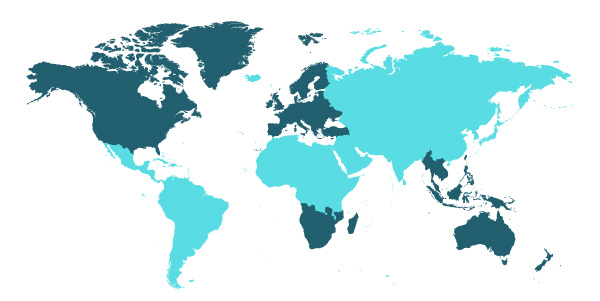IR Around the World Continues to Grow and Strengthen
 Data-informed decision making continues to be a focal point for higher education leaders around the world and colleagues across the globe work hard in this area. Although it may be called by a slightly different name or encompass some different tasks, there are many similarities in institutional research (IR) across the world.
Data-informed decision making continues to be a focal point for higher education leaders around the world and colleagues across the globe work hard in this area. Although it may be called by a slightly different name or encompass some different tasks, there are many similarities in institutional research (IR) across the world.
Last spring, a few colleagues around the world shared some news in eAIR
of institutional research, planning, and strategy activities happening in their parts of the world. Again this year, some of our IR colleagues around the world wish to report on some happenings that are currently under way or soon to commence. We
invite you to get to know your global colleagues and further strengthen IR around the world.

Dark teal: Regions represented by geographically-based AIR Affiliated Organizations
Of the AIR affiliated groups, many represent international regions of the world (http://www.airweb.org/AO). Although independent, they all have an important relationship
with AIR and have the same common goal to build and strengthen the capacity to
use data for higher education success. We are a stronger community when we
share ideas, challenges, and solutions with each other, and we invite you to
connect with other colleagues. We can learn from each other and make IR
stronger. See information below on local IR and related conferences.
AUSTRALIA
Angel Calderon
Academic planning and data-informed decision making remain strong in Australia. In late February 2024, the Australian government released the final report from the Australian Universities Accord panel. The changes proposed by the review are significant and require a boost in investment and leadership for its ambitions to be realized (for example, lifting the tertiary attainment rate from its current 60% to 80% by 2050).
One of the key recommendations is the establishment of a tertiary education commission, charged with the task to provide the leadership and stewardship necessary to transform the tertiary education system and achieve agreed policy objectives for Australia’s tertiary education.
The creation of the commission is likely to strengthen the nexus between policy and evidence-driven decision making. In doing so, institutional research and planners (IR&P) will continue to play a pivotal role in shaping Australia’s system in supporting decision makers, pursuing policy objectives, and achieving institutional missions.
IR&P practitioners have demonstrated efforts in enhancing the reliability of data quality and insights, as well as using artificial intelligence to improve service effectiveness and ensure university leaders are well equipped to make informed decisions.
The Australian government is yet to respond to the panel recommendations, but more timely and reliable data on every aspect of universities’ operations will continue to be essential in guiding decision making at times of global uncertainty, reduced government funding, and competing priorities.
UK & IRELAND Higher Education Institutional Research (HEIR) Network
Matt-Hiely-Rayner and Rachel Bowden
Although
institutional research (IR) is not a universally recognized term in UK Higher
Education, there are plenty of activities taking place that would be described
as such in other national systems. Evaluation activity tends to be diffuse
throughout academic teams and professional services that are dedicated to
student support and widening access. IR relating to Analytics is often to be
found in Strategic Planning functions, where business intelligence and data
governance provide the vital ingredients to support data-driven insights.
This
centre of gravity is influenced by the role of the UK’s central agencies that
collect data and dispense student funding. Data-driven funding historically
necessitated strong predictions of student activity and hence a focus on the
analysis of patterns of student behaviour, while the ease with which national
data sets can be converted into reputation-critical rankings have caused
analytical capabilities to be situated in close proximity to executive teams.
The
UK and Ireland HEIR Network Events – HEIR
Network was established in 2008 to bring together those
colleagues with an interest in IR across higher education in the UK and
Ireland. The network fosters knowledge
exchange, collaboration, and good practice sharing among its members. It is free to join and coordinated by a
voluntary planning group that works to continually develop the forum, providing
opportunities for professionals engaged in IR to connect, develop ideas, and
disseminate findings. Through its flagship annual conference and the new series
of online lunchtime sessions on themes such as Equality Charters, new
qualitative analysis techniques, league table methodologies, national student
surveys, and more, members have access to the unique, diverse range of
colleagues in our network. Join us!
Japan
Tomoko Torii
IR encompasses job responsibilities such as university education quality assurance, learning outcome assessment, and advanced data management. However, it is challenging for IR practitioners in Japan to specialize in IR due to the practice of staff rotation.
Japanese university staff undergo regular internal job transfers. As they shuffle between different departments, they cannot settle down and specialize in a single area such as IR. Consequently, IR services are facilitated by individuals with diverse backgrounds (Torii et al., 2023). Few staff members specialize solely in IR, as individuals juggle multiple responsibilities encompassing IR, evaluation, and planning. This phenomenon may intrigue foreign universities where specialized professionals are the norm.
On the positive side, staff rotation helps bridge the gap between IR and institutional effectiveness (IE). By engaging IR personnel in various roles, universities can better understand their endeavors toward student success, thereby fortifying both IR and IE. When viewed this way, Japan's unique internal rotation system nurtures a broad outlook among IR staff, fosters collaboration with students and faculty, and facilitates effective reporting. Such initiatives bolster IR capacity and help achieve successful IR and IE through a holistic approach.
Currently, efforts are underway for individual institutional training and introductory courses for grooming IR practitioners within the Japanese Consortium of Accreditation Coordinators for Higher Education. Additionally, practical skill development is supported through IR networks like the Japan Association for Institutional Research. These endeavors equip learners with specialized competence in IR, alongside a deep understanding of the university culture and context.
Overall, there is a discernible trend toward practical approaches that prioritize enhancing data literacy across all staff, rather than specialized programs, reflecting an evolution in response to the demands of the digital age. This shift holds promise for elevating the competency level in IR across Japanese universities.
Southern Africa: Charting the Course of Excellence: SAAIR's Pioneering Journey in Institutional Research
Liile Lerate Lakena
In the burgeoning field of Institutional Research (IR) in Southern Africa, the year 2024 encapsulates the spirit of evolution and collaboration that has been the hallmark of the region's educational landscape for over three decades.
Encapsulating the essence of Gartner's Data Analytics Maturity model, the Learner Analytics Institute, which commenced in May, pioneers a progressive approach to IR. The theme, “The Holy Grail of Data Analytics Maturity,” symbolizes a nuanced transition from mere descriptive analytics toward a more sophisticated, prescriptive paradigm. This shift underscores not just the understanding or anticipation of trends through data, but the crafting of strategic actions that mould the future of higher education with wisdom gleaned from past and current insights.
The institutes that follow are testament to the multifaceted nature of IR. July's IR Institute heralds multidisciplinarity, reflecting the myriad intellectual streams that converge to shape education. In August, the HEMIS Institute broadens its canvas, replacing the foundational HEMIS workshops with Primer Workshops to cultivate a deeper comprehension of the higher education sector. This initiative, underpinned by a trial run, reflects a dedication to continuous improvement and contextual relevance.
A dedicated day for "Student HEMIS" signifies a collaborative evolution, transforming the HEMIS Institute into a crucible for sharing, critiquing, and enhancing national educational processes. As we thread through September's Quality Forum and approach the annual conference in November, themed “Transformed Reimagined University Experience (TRUE),” there is a palpable momentum toward redefining the university experience.
After 31 years, IR in Southern Africa has emerged from its nascent stages into a beacon of wisdom that does not merely track and report but shapes the trajectory of education. Through collaborative exploration and the strategic application of data analytics, IR professionals are not just narrators of the academic journey; they are its cartographers, drawing the map that leads to a transformative educational odyssey.
Angel J. Calderon is Director of Strategic Insights at RMIT University, Melbourne, Australia.
Rachel Bowden is Co-Chair of the UK & Ireland HEIR Network and Head of the Evaluation and Policy Department at the University of Brighton, England.
Matt Hiely-Rayner is Co-Chair of the UK & Ireland HEIR Network and Director of Strategic Planning and Change at Buckinghamshire New University, England.
Tomoko Torii is a Professor in the Institute for Teaching and Learning, Ritsumeikan University, Japan, torii@fc.ritsumei.ac.jp Contact for IR info in Japan: torii@fc.ritsumei.ac.jp
Liile Lekena-Bayaga is President of the Southern Africa Association for Institutional Research (SAAIR) and Senior Executive Director for Institutional Planning and Research at Mangosuthu Institute of Technology, Durban, South Africa.
